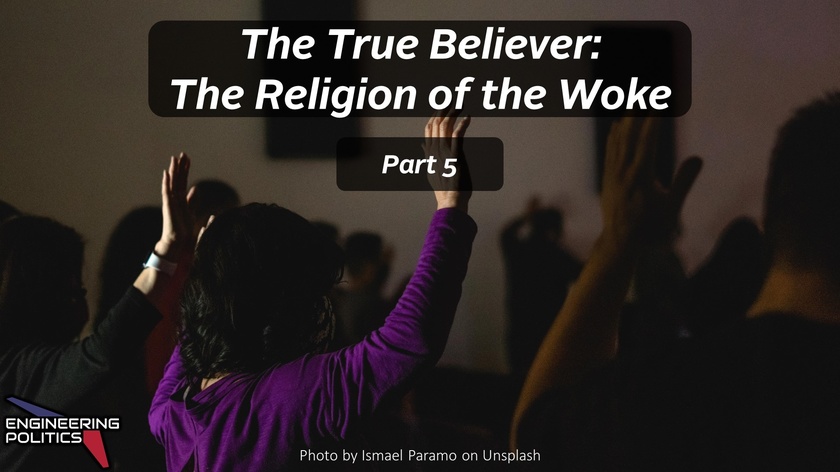
In my review coving the second half of Part 3: United Action and Self-Sacrifice, Hoffer moves from mass movements promotingself-sacrifice to common unifying agents that hold the movement together. He starts by explaining how it is easier to bring people together over common hatred and resentment more effectively than any positive influence. Hoffer expands more on hatred as a unifying agent by writing:
“Mass movements can rise and spread without belief in a God, but never without belief in a devil… Common hatred unites the most heterogeneous elements.”
We all know hate is a powerful force, but it is harder to look at it as an element of unity. But, as we are seeing today in the United States, our politics and even many aspects of our culture use the hatred of one group or idea to create a coalition between other groups. Hatred gives them a new sense of purpose. Hoffer continues:
“Passionate hatred can give meaning and purpose to an empty life. Thus people haunted by the purposelessness of their lives try to find a new content not only by dedicating themselves to a holy cause but also by nursing a fanatical grievance. A mass movement offers them unlimited opportunities for both.”
The phrase that sticks out to me in the quote above is “fanatical grievance.” That perfectly describes the aims of groups like Black Lives Matter (BLM), the organization and its leadership, and the ideas pushed in the academic teachings in Critical Race Theory (CRT). There is a reason why grievance studies – a phrase coined by Helen Pluckrose, James Lindsey, and Peter Boghossian – is gaining so much popularity in all levels of education. As the name suggests, grievance studies focus in on why groups must feel marginalized and oppressed no matter the individual experiences of those in the group or contrary empirical evidence. Even though this behavior is extremely damaging to individual capacity for self-improvement, wokeism uses this tactic to create division, blame that division on some exterior force, and then claim to be a common unifier. This creates hatred and resentment, but the weird thing is the most visceral hatred we see today is often between groups who believe in almost the exact same things. Hoffer continues by highlighting this point:
“The undercurrent of admiration in hatred manifests itself in the inclination to imitate those we hate. Thus every mass movement shapes itself after its specific devil.”
As I stated in the previous review (Part 4), the radical Left and the radical Right are basically the same people. They almost seem to imitate each other in their actions, their hatreds, and their truths. The CRT types are just as racist as any neo-Nazi. ANTIFA members are just as violent as any white supremacist terrorist. The BLM leadership who tells every “person of color” to fear “white supremacy” uses the same type of propaganda as any white trash community tells its members to fear the “browning of America.” Both sides know their devil, but they will not admit how much they admire their devil’s tactics and ability to create hate.
The next unifying agent is imitation, but Hoffer is referring to people within the mass movement imitating each other. Hoffer writes:
“The chief burden of the frustrated is the consciousness of a blemished, ineffectual self, and their chief desire is to slough off the unwanted self and begin a new life. They try to realize this desire either by finding a new identity or by blurring and camouflaging their individual distinctness; and both these ends are reached by imitation.”
I went over the power of frustration in previous reviews and imitation within a larger group is a great way to mask that frustration. A new identity can be found in the larger group. There are two major problems with this: (1) This does not alleviate frustration but only camouflages it, and (2) this creates a mass movement of angry, frustrated people. The latter problem is often seen as a positive solution to growing a mass movement, and the former problem is only a concern when the movement loses steam. Imitating others within a group is not a solution to relieve frustration, but it is, as Hoffer states, “often a shortcut to a solution.” A corrupt mass movement, like the one wokeism leads, demands imitation of its followers with a promise of solutions in the future. Those solutions never come.
The next unifying agent is persuasion and coercion. Hoffer writes:
“We tend today to exaggerate the effectiveness of persuasion as a means of inculcating opinion and shaping behavior. We see in propaganda a formidable instrument… Contrary to what one would expect, propaganda becomes more fervent and importunate when it operates in conjunction with coercion than when it has to rely solely on its own effectiveness.”
One could argue we, currently, live in the age of propaganda. It has never been easier to push a narrative. But with all these narratives flying back and forth, it takes an added push for one to really latch onto your brain. That added push is coercion. Calling someone a “racist” or a “fascist” is not only a verbal threat, but it comes with the added implication of physical retaliation. If we used words like “racist” and “fascist” correctly, physical retaliation might be warranted, but that is not the case anymore. These misused labels come as threats of not only physical violence but of career ending cancellations as well. Propaganda plays another critical role when the mass movement gets rolling. Hoffer continues:
“Propaganda thus serves more to justify ourselves than to convince others; and the more reason we have to feel guilty, the more fervent our propaganda.”
There is a common misconception that people of high intelligence are better at finding the truth. This is incorrect. High IQ individuals are better equipped to find justifications for their own preconceived notions more than find the objective truth. Effective propaganda works the same way. Good propaganda will disguise the truth for a while. Great propaganda will get people finding ways to disguise the truth from themselves. Although I find it hard to label ideas like socialism and CRT as “great propaganda,” the veil of physical violence and career suicide makes up for some of what the ideas lack.
The next unifying agent is leadership. This one seems obvious, but, as I will explain, wokeism is unique when it comes to its leadership, or lack thereof. Hoffer writes:
“No matter how vital we think the role of leadership in the rise of a mass movement, there is no doubt that the leader cannot create the conditions which make the rise of a movement possible. He cannot conjure a movement out of the void. There has to be an eagerness to follow and obey, and an intense dissatisfaction with things as they are, before movement and leader can make their appearance.”
This certainly applied to the mass movements of the 20th century, but with the rise of the technical age where voices can be amplified all over the world, can a mass movement move be sustainable without a leader? If we look at the mass movement on the Right, seen as a reaction to the woke movement, we have the typical strong leader in President Donald Trump. This, for good reason backed by history, set off a few red flags for the Left, moderates, and even some on the Right during his rise. Many of those concerns were invalidated by his non-radical actions when he was in power even though the woke were still able to take advantage of this momentum and fear. So, we can clearly define the leader opposing wokeism, but can we define the leader of the religion of the woke itself? Not really, and I do not think we will be able to because of something I mentioned in the previous review – wokeism is parasitic in nature.
Leadership will bounce around from person to person much like a parasite will jump from host to host. You cannot lead for long if the movement is ready to kill you at any moment. If fact, I do not think anyone really wants to lead this woke movement for fear it will come after them next. Because of this, leadership as described by Hoffer might be the only marker for a mass movement wokeism does not fit. Although, to be fair, I do not think Hoffer could have seen this type of mass movement coming, which is not super encouraging to me.
The next unifying agent is action. Hoffer writes:
“All mass movements avail themselves of action as a means of unification. The conflicts a mass movement seeks and incites serve not only to drown its enemies but also to strip its followers of their distinct individuality and render them more soluble in the collective medium.”
A large group, no matter how diverse it is, acting towards one collective goal tends to be very successful. But, as Hoffer will go on to say, continuous successful action is actually not a good thing for the lifespan of a mass movement. Hoffer continues:
“However, the exceptional fitness of the true believer for a life of action can be as much a danger as an aid to the prospects of a mass movement. By opening vast fields of feverish action a mass movement may hasten its end… The true believer who succeeds in all he does gains self-confidence and becomes reconciled with his self and the present… Thus the taste of continuous successful action is fatal to the spirit of the collective.”
There is a reason why the stated goals of a mass movement are often not the intended goals of its leadership or ideology. Wokeism is not exempt from this. Really any political movement, such as the War on Poverty, rarely meets its goals because meeting those goals would disband the movement. If we were to actually take steps to eliminate any real forms of oppression left in the Western world, would wokeism be attractive to anyone? In fact, as I have mentioned several times before, the woke must manufacture obstacles and enemies for them to fight in order to maintain influence. They see it as part of their job to make people believe they are losing their battle against oppression – based on the neo-Marxian idea of false consciousness. If they stubble across any real oppression, they will use it to their political advantage but will never consider solving the problem at the risk of weakening their movement.
The final unifying agent is suspicion. Suspicion is not only a unifying agent, but it is also inherent in most mass movements. Hoffer writes:
"[W]hen the frustrated congregate in a mass movement, the air is heavy-laden with suspicion. There is prying and spying, tense watching and a tense awareness of being watched. The surprising thing is that this pathological mistrust within the ranks leads not to dissension but to strict conformity... It is the sacred duty of the true believer to be suspicious."
I will go over how this relates to the mass movements we see today, but first I must tell you how I laughed out loud when I read this part of the book. I did not laugh because it was comical – being in a constant state of paranoia is terrifying – but because this made me think of one of my favorite movies to come out in the last 10 years – The Death of Stalin (2018). This brilliant movie is a perfect theatrical version of what Hoffer is trying to explain here. All the characters are in a constant state of paranoia that led them to maintain strict conformity to Stalin's police-state culture even after he is dead and they are in full rebellion. If you have not seen this movie, I urge you to go check it out. Comedy is often the best way to explain tragedy.
This suspicion element certainly holds true with wokeism today. As I have said before, there is no clearly defined leader of this movement because it would be terrifying to lead a movement ready to devour anyone including the people within it. No one in their right mind wants to subject themselves to that type of paranoia. Being suspicious of everyone around you is the rule, not the exception.
This covers all the unifying agents Hoffer details in his book, but he also ends this section by describing the effects of unification. Hoffer writes:
“Unification is more a process of diminution than of addition. In order to be assimilated into a collective medium a person has to be stripped of his individual distinctiveness. He has to be deprived of free choice and independent judgement. Many of his natural bents and impulses have to be suppressed or blunted. All these are acts of diminution. The elements which are apparently added – faith, hope, pride, confidence – are negative in origin. The exaltation of the true believer does not flow from reserves of strength and wisdom but from a sense of deliverance: he has been delivered from the meaningless burdens of an autonomous existence.”
Unification is a means of a mass movement to remove the burden of freedom from its followers. This builds dependence on the collective, and the collective only finds meaning in the pursuit of an unattainable holy cause.
With this insight you should be able to know whether or not you are becoming involved with a corrupt mass movement. If the movement demands you strip yourself of your individuality in favor of a collective identity, it is a corrupt movement that is attempting to use you.
Thank you for reading, but due to the length of this piece, I need to split it into parts. The next part will be coming shortly. Also, I plan on releasing these in the Engineering Politics Locals Community a week or so before I republish them on Medium. This way the members of this community get to see it first. I really appreciate your support because this type of content takes some time and a lot of thought to produce. I will also do a podcast covering this material shortly after it is completed. Thanks again!

I was listening to some news updates when I heard this CNN clip about the potentially hazardous water in East Palestine, and as soon as I heard her ask the question about whether or not her guest would drink the water, I IMMEDIATELY thought of this clip from South Park. Enjoy.
In this special episode of The Engineering Politics Podcast, Truman from Return To Reason is back for a new video and podcast series titled ‘Revisiting The Road To Serfdom’ where we review F.A. Hayek’s classic work, The Road To Serfdom. This episode covers ‘Chapter 15: The Prospects of International Order’.
This will be an ongoing series that covers the entire book. We put a ton of work into making this insightful and relevant, so we hope you enjoy watching/listening as much as we enjoyed reading and recording.
Become a subscriber of the Engineering Politics Locals Community to support this content. Also, consider joining the @ReturnToReason Locals Community to show Truman some support.
In this episode of The Engineering Politics Podcast, I team up with Truman from @ReturnToReason to interview one of the most intelligent and influential creators in the space of philosophy today. Stephen R.C. Hicks is a Professor of Philosophy at Rockford University, Executive Director of the Center for Ethics and Entrepreneurship, and Senior Scholar at The Atlas Society. He has written many books including Explaining Postmodernism and Nietzsche and the Nazis. We bring him on to talk about the social and political issues we are currently facing in America, and the West more broadly, and what the collectivist ideas of Jean-Jacques Rousseau might have to do with it.
Become a subscriber of the Engineering Politics Locals Community to support this content. Also, consider joining the @ReturnToReason Locals Community to show Truman some support.
In this special episode of The Engineering Politics Podcast, Truman from Return To Reason is back for a new video and podcast series titled ‘Revisiting The Road To Serfdom’ where we review F.A. Hayek’s classic work, The Road To Serfdom. This episode covers ‘Chapter 15: The Prospects of International Order’.
This will be an ongoing series that covers the entire book. We put a ton of work into making this insightful and relevant, so we hope you enjoy watching/listening as much as we enjoyed reading and recording.
Become a subscriber of the Engineering Politics Locals Community to support this content. Also, consider joining the @ReturnToReason Locals Community to show Truman some support.
In this episode of The Engineering Politics Podcast, I team up with Truman from @ReturnToReason to interview one of the most intelligent and influential creators in the space of philosophy today. Stephen R.C. Hicks is a Professor of Philosophy at Rockford University, Executive Director of the Center for Ethics and Entrepreneurship, and Senior Scholar at The Atlas Society. He has written many books including Explaining Postmodernism and Nietzsche and the Nazis. We bring him on to talk about the social and political issues we are currently facing in America, and the West more broadly, and what the collectivist ideas of Jean-Jacques Rousseau might have to do with it.
Become a subscriber of the Engineering Politics Locals Community to support this content. Also, consider joining the @ReturnToReason Locals Community to show Truman some support.
In this special episode of The Engineering Politics Podcast, Truman from @ReturnToReason is back for a new video and podcast series titled ‘Revisiting The Road To Serfdom’ where we review F.A. Hayek’s classic work, The Road To Serfdom. This episode covers ‘Chapter 14: Material Conditions and Ideal Ends’.
This will be an ongoing series that covers the entire book. We put a ton of work into making this insightful and relevant, so we hope you enjoy watching/listening as much as we enjoyed reading and recording.
Become a subscriber of the Engineering Politics Locals Community to support this content. Also, consider joining the @ReturnToReason Locals Community to show Truman some support.














